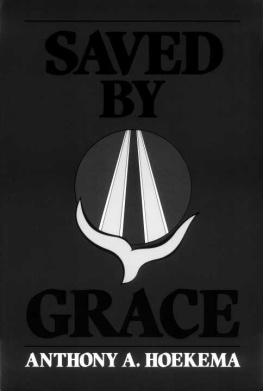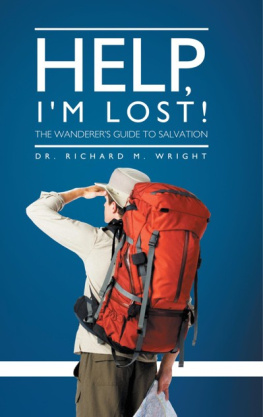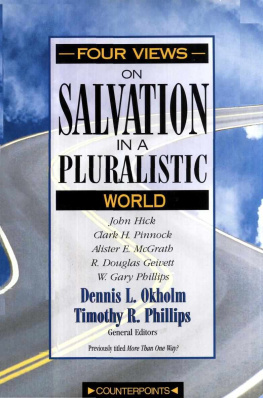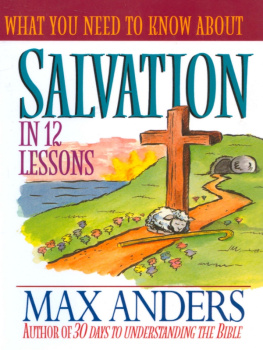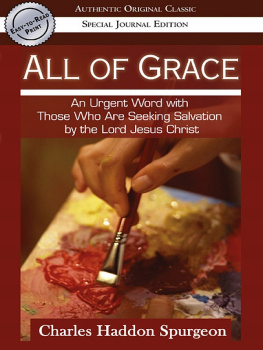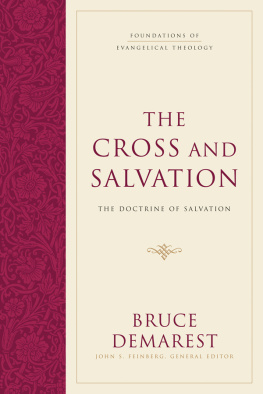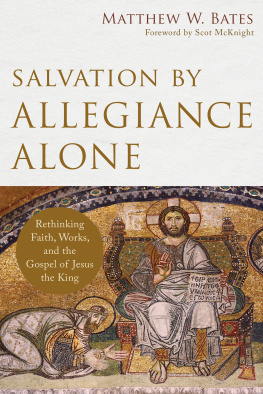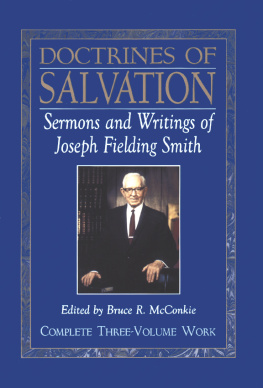SAVED
BY GRACE
SAVED
by
GRACE
Anthony A. Hoekema






To the memory of my dear parents, Peter and Jessie Hoekema, who first taught me whom it meant to be saved by grace
Contents
ix
xi
xiii
Foreword: In Memoriam
SAVED BY GRACE IS ANTHONY HOEKEMA'S SEVENTH BOOK AND THE last of three expository studies in central topics of Reformed theology. The present examination of the doctrine of salvation completes a series encompassing books on eschatology (The Bible and the Future, 1979) and theological anthropology (Created in God's Image, 1986).
Tony completed the manuscript of the present study just before his seventy-fifth birthday. It was to be his last birthday and his last book. A few months later, on October 17, 1988, our husband and father died of a stroke he had suffered two days earlier. Thus did his life of teaching and scholarship come to an end and his experience of the saving love of Jesus Christ enter a new stage.
The author dedicated this book to the memory of his parents, a Frisian tailor and a strict but loving mother who shared their son's joy in his ministerial calling but passed away before his first book (The Four Major Cults, 1963) was published. Our sadness in the loss of a husband and a father is tempered by thankfulness for his forty-four years of ministry to the church through preaching, teaching, and writing, and in seeing this book to publication we add a rededication to his memory.
Anthony Andrew Hoekema was born in Drachten, Friesland, in 1913 and moved from the Netherlands to the United States with his parents and two brothers in 1923. Tony attended Baxter Christian School, graduated from Grand Rapids Christian High School, and received the B.A. from Calvin College in 1936-a path also followed by all four of his children, thirty years later. He received the M. A. in psychology from the University of Michigan in 1937 and the Th.M. from Calvin Theological Seminary in 1944. He went on to receive the Th.D. from Princeton Seminary in 1953. Following his ordination to the ministry in 1944 he served three Christian Reformed Churches as pastor: Twelfth Street in Grand Rapids, Bethel in Paterson, New Jersey, and Alger Park in Grand Rapids.
In 1956 Tony was called to continue his ministry through teaching, first at Calvin College and then, from 1958 until his retirement in 1978, at Calvin Seminary, where he held the chair of Professor of Systematic Theology. He is remembered by students and parishioners alike-so we have been reminded often in the months since his passing-for his clarity of mind, his precision of expression, his warm personal interest in all whose lives touched his, and his weakness for awful puns. All of these traits save the last, we hope, have been evident in his writing.
At Tony's passing the present study was already in production, and it was left to us only to complete a few editorial and proofreading tasks and to supply indices. It has been not a burden but a privilege to make this modest contribution to the completion of Tony's scholarly and pastoral work.
We do not know what joys our husband and father now enjoys in the presence of our Savior; but we hope and pray that his endeavor to articulate the Bible's teaching concerning salvation will deepen others' understanding of this richness of the gift of grace that we receive through God's boundless love.

Preface
THIS IS THE THIRD IN A SERIES OF DOCTRINAL STUDIES. THE FIRST, THE Bible and the Future, was a presentation of Christian eschatology, or the doctrine of the last things. The second, Created in God's Image, dealt with Christian anthropology, or the Christian doctrine of man.
This book concerns what theologians call soteriology, or the Christian doctrine of salvation. I have tried to draw answers to my questions in this area primarily from the Bible. My theological position is that of evangelical Christianity, interpreted from a Reformed or Calvinistic perspective.
The Reformed understanding of Scripture begins with a recognition of the sovereignty of God in all things, including our salvation. One of the central teachings of the Bible, sounded repeatedly, like the major theme of a symphony, is that we are saved wholly by grace, through the powerful working of God's Holy Spirit, on the basis of the all-sufficient work of our Savior, Jesus Christ.
At the same time, however, the Scriptures teach that God saves us not as puppets but as persons, and that we must therefore be active in our salvation. The Bible, in a way which is deeply mysterious, combines God's sovereignty with our responsibility in the process of our salvation. But we can only love him because he first loved us. To him therefore must be all the praise.
Again I should like to thank my many students at Calvin Theological Seminary, whose questions, challenges, and comments in the classroom helped to deepen my insights into this aspect of Scripture teaching.
I am grateful to the Calvin Theological Library for the use of its excellent resources, and for the privilege of occupying an office in the library during my retirement. I would like to give special thanks to the theological librarian, Peter De Klerk, for his exceptional helpfulness.
The editorial staff at the Eerdmans Publishing Company has provided the kind of expertise that is a joy to an author's heart. I wish especially to thank Jon Pott and Milton Essenburg.
I owe to my wife, Ruth, more gratitude than I can express for her constant interest and encouragement, for her many suggestions, and for her help with the bibliography. Without her, this book would have lacked sparkle.
Most of all, I owe thanks and praise to the God of all grace, who gave me the strength to write. Through this study I have become overwhelmed anew by the incomprehensible greatness of his mercy to undeserving sinners like ourselves. We look forward with eager anticipation to the final perfection of the work he has begun in us, when we shall see him face to face, and tell the story, "saved by grace."

Abbreviations

(See Bibliography for full publishing information.)
CHAPTER 1
Orientation
BY HIS TOTAL OBEDIENCE TO THE FATHER AND BY HIS SUFFERING, death, and resurrection, our Lord Jesus Christ earned for us salvation from sin and from all its results. But this saving work of Christ will avail us nothing until it has been applied to our hearts and lives by the Holy Spirit. The study of the application of the work of redemption to the people of God is called soteriology, from two Greek words, soteria and logos, meaning "the doctrine of salvation."
In the present volume, however, soteriology or "the doctrine of salvation," as it is more commonly called, will be understood as including only the study of the application of the blessings of salvation to the people of God, and their restoration to God's favor and to a life of fellowship with him in Christ. It should be understood that this application is the work of the Holy Spirit, though it must be appropriated by faith.

